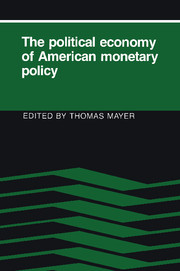Book contents
- Frontmatter
- Contents
- Preface
- List of contributors
- 1 Introduction
- 2 Studying the Fed: toward a broader public-choice perspective
- 3 The Federal Reserve reaction function: a specification search
- 4 Corporate profitability as a determinant of restrictive monetary policy: estimates for the postwar United States
- 5 Federal Reserve behavior since 1980: a financial-market perspective
- 6 The Federal Reserve and its institutional environment: a review
- 7 The political economy of monetary policy
- 8 Political monetary cycles
- 9 Congress and the Fed: why the dog does not bark in the night
- 10 The Federal Reserve as a political power
- 11 Monetary policy and political economy: the Federal Reserve and the Bank of Japan
- 12 A positive analysis of the policy-making process at the Federal Reserve
- 13 A theory of FOMC dissent voting with evidence from the time series
- 14 Explaining FOMC members' votes
- 15 Fed behavior and X-efficiency theory: toward a general framework
- 16 Minimizing regret: cognitive dissonance as an explanation of FOMC behavior
- 17 The discount window
- 18 Leaning against the wind: the behavior of the money stock in recession and recovery, 1953–8
- 19 Bureaucratic self-interest as an obstacle to monetary reform
- Index
4 - Corporate profitability as a determinant of restrictive monetary policy: estimates for the postwar United States
Published online by Cambridge University Press: 06 July 2010
- Frontmatter
- Contents
- Preface
- List of contributors
- 1 Introduction
- 2 Studying the Fed: toward a broader public-choice perspective
- 3 The Federal Reserve reaction function: a specification search
- 4 Corporate profitability as a determinant of restrictive monetary policy: estimates for the postwar United States
- 5 Federal Reserve behavior since 1980: a financial-market perspective
- 6 The Federal Reserve and its institutional environment: a review
- 7 The political economy of monetary policy
- 8 Political monetary cycles
- 9 Congress and the Fed: why the dog does not bark in the night
- 10 The Federal Reserve as a political power
- 11 Monetary policy and political economy: the Federal Reserve and the Bank of Japan
- 12 A positive analysis of the policy-making process at the Federal Reserve
- 13 A theory of FOMC dissent voting with evidence from the time series
- 14 Explaining FOMC members' votes
- 15 Fed behavior and X-efficiency theory: toward a general framework
- 16 Minimizing regret: cognitive dissonance as an explanation of FOMC behavior
- 17 The discount window
- 18 Leaning against the wind: the behavior of the money stock in recession and recovery, 1953–8
- 19 Bureaucratic self-interest as an obstacle to monetary reform
- Index
Summary
Current debates over international coordination of macroeconomic policy pose interesting conundrums for our understanding of domestic monetary policy. For a number of years the United States has been exerting pressure on Japan and West Germany to pursue an easier monetary policy, and particularly in the case of the West Germans the United States has been unsuccessful. German officials cite fear of inflation as their rationale for a restrictive policy. Yet, last year, consumer prices fell in West Germany, casting suspicion on either the sincerity or wisdom of the German government's stance.
An alternative explanation, now recognized by economists and other observers, is that macroeconomic expansion is thought by the German government to be incompatible with maintenance of corporate profitability in West Germany (Llewellyn 1983). The German case suggests the need to rethink traditional approaches to understanding macroeconomic policy in general and monetary policy in particular.
This chapter attempts such a rethinking. Using the case of the United States, we investigate the hypothesis that the Federal Reserve's monetary policy is motivated by a concern for corporate profitability. We reinterpret the standard evidence on the determinants of monetary policy in light of this hypothesis. The results are consistent with the view that the Federal Reserve is acting so as to maximize the (weighted) profitability of finanical and nonfinancial corporations. Furthermore, there is no evidence that the Fed independently attempts to promote labor's interests.
Theories of monetary policy
It is well established that the Federal Reserve responds to inflation and the growth of output by leaning against the wind. Reaction-function studies such as that of McNees (1986) support this proposition.
- Type
- Chapter
- Information
- The Political Economy of American Monetary Policy , pp. 49 - 62Publisher: Cambridge University PressPrint publication year: 1990
- 7
- Cited by



